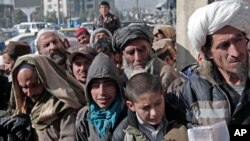The number of people in Afghanistan turning to desperate means to secure enough food to sustain their families has almost doubled in the last year.
The United Nations and its partner agencies said in a report issued Thursday that more than 1.5 million people were now considered severely food insecure, an increase of more than 317,000. Another 7.3 million people — more than one in every four Afghans — are classified as moderately food insecure.
The U.N. defines food insecurity as the lack of "physical and economic access to sufficient, safe and nutritious food to meet their dietary needs and food preferences for an active and healthy life."
The 2015 Seasonal Food Security Assessment in Afghanistan, published by the country's Food Security and Agriculture Cluster, said of greatest concern is that the number of severely food insecure people who already have exhausted their capacity to cope with these emergencies has increased — meaning many more are now forced to sell land, take children out of school to work or depend on relatives for support.
The report said the number of people engaged in these last-ditch actions had doubled over the past year to more than 20 percent of food insecure people across the country.
"Although Afghanistan will produce slightly more wheat this year, a large number of poor and hungry people will not be able to purchase food from the market," said Tomio Shichiri, U.N. Food and Agriculture Organization representative in Afghanistan. "It is a question of access to food, rather than its production."
The report also found that households headed by women were almost 50 percent more likely to be severely food insecure than others in Afghanistan. Women who led their households were also twice as likely to use emergency coping strategies, such as begging.
The aid agencies appealed for increased financial aid to try to stem the crisis.





